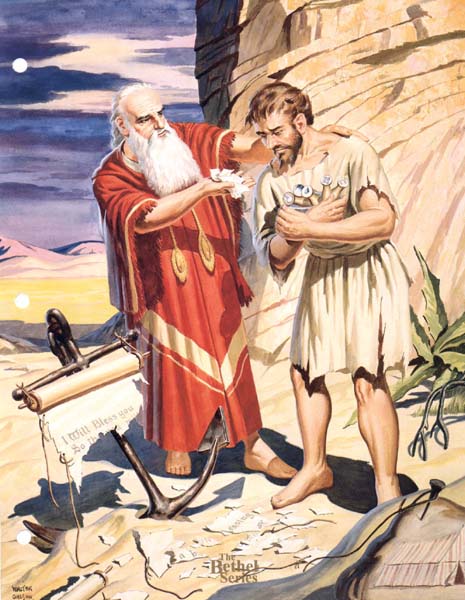- The Great Decline - No sooner had the chosen ones kept their rendezvous with greatness than they began a decline which was destined to turn their glory into dust. Idolatry, spiritual blindness, and a complete breakdown of moral integrity plagued the nation. The prophet stepped up and declared judgement would come but Israel would not listen.
- Israel Felt Secure in the Promises of God - The prophet's doom preaching seemed like utter nonsense to a people who had begun to think of themselves as God's pet in the household of nations. God may rain ruin on the uncircumcised infidels who chased after other gods; but God would bless Israel. Confident that no evil could befall them, the people of Israel put cotton in their ears and refused to take the prophet seriously.
- Israel Paid Little Attention to the Responsibilities Inherent in Its Destiny - The character of the age made it apparent to the prophet that the nation was seeking privileges apart from responsibility. Israel coveted the idea of being blessed but gave little evidence of being a blessing. Israel soon went searching for new things in the enemy camp. There the covenanters struck a bargain with the devil and clasped hands with the forces of darkness. Marching to the music of pagans, Israel inherited their kinds of ethics and became a miserable failure at "being a blessing".
- Yet Israel Appeared Religious Enough - Outwardly, the chosen people displayed all the signs of a religious people. They went through religious calisthenics, flexed their spiritual muscles, and made no end of displaying their religious prowess. But it was an empty activism devoid of any good fruit. The prophet was not blind. He knew that Israel's institutions and its traditions had become its religion. Israel worshiped things rather than the One who had given them. That which had been designed to be "means to and end" had become an "end in itself".
- The Temple, a Reason for False Security - Thousands who thronged the temple of God worshiped not him but the Temple itself. Hence, much of what God's people heard in his house was promptly forgotten when they left that house. The moral note inherent in the law and proclaimed in the sanctuary was neither sounded nor practiced on Israel's streets. Religious expression was divorced from ethics.
- The Law Made a Stumbling Block to Justice - ". . . But you have turned justice into poison and the fruit of righteousness into wormwood."
(Amos 6:12)
- Separation Turned Into a Curse - "When God saw what they did, how they turned from their evil way, God repented of the evil which he had said he would do to them; and he did not do it. BUT IT DISPLEASED JONAH EXCEEDINGLY, AND HE WAS ANGRY". (Jonah 3:10 - 4:1)
- Circumcision Becomes a Fetish - Though not directly stated, it is implied that circumcision, too, became and end in itself during the age of decline. "Behold the days are coming, says the Lord, when I will punish all those who are circumcised, yet uncircumcised . . . all the house of Israel is uncircumcised in heart". (Jer. 9:25-26)
- The Holy Land Put to Unholy Use - Israel had forgotten the command that the promised land must always remain a land of promise and in the perilous lapse of memory was rebuked by the prophet: "And I brought you into a plentiful land to enjoy its fruits and its good things. But when you came in you defiled my land, and made my heritage an abomination". (Jer. 2:7)
- Israel Recalled to Its Destiny - The prophet picked up the shattered fragments of a broken destiny and beckoned them back to what they were called to be. Their false sense of security in the promises of God, their abandonment of responsibility, their ill-founded hopes in the temple, their proud isolationism, their sordid use of the law, and the folly of their sacrifices and meaningless activism could bring little of blessing to the world. All was lost motion and unacceptable in God's sight. The prophets earnest plea was that Israel turn back to God and take up the march again on the road to triumph!
|

